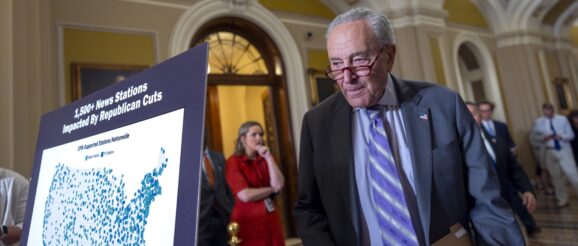Senate approves Trump administration cuts to public broadcasting and foreign aid

The Senate has approved the Trump administration’s $9 billion rescission package aimed at clawing back money already allocated for public radio and television — a major step toward winding down nearly six decades of federal funding for the Corporation for Public Broadcasting.
In a marathon “vote-a-rama” session that lasted into the small hours Thursday, senators introduce numerous amendments, before ultimately voting 51-to-48 to approve the package that includes cuts to foreign food and health programs. One senator, Minnesota’s Tina Smith, was not present at the vote due to hospitalization.
The senate’s approval tees up a final showdown in the House, which approved an earlier version last month.
The Senate vote was largely along party lines, with Democrats voting against the bill and all but two Republicans voting for it. The GOP exceptions were Maine’s Susan Collins and Alaska’s Lisa Murkowski. Kentucky Republican Sen. Mitch McConnell, who voted on Tuesday not to advance debate on the bill, prompting Vice President JD Vance to cast a tie-breaking vote, nonetheless approved the final measure.
In a separate statement, Kate Riley, president and CEO of America’s Public Television Stations, said the organization was “devastated that the Senate voted to eliminate federal funding to the local public television stations throughout this country that provide essential lifesaving public safety services, proven educational services and community connections to their communities every day for free.”
“I’m looking at a text that I received from the station manager there,” she said relating how the station’s three staff members broadcast emergency messages despite a tsunami warning that was later lifted. The text said the local community was instructed to listen to the local public radio station.
“I have an amendment that protects public media, their independence, their ability to provide local news, weather reports and, yes, emergency alerts,” Murkowski said. “We’re reminded today this stuff matters, so I would hope my colleagues would recognize what is at stake and vote for my amendment.”
But a majority voted against it.
Wisconsin Democrat Sen. Tammy Baldwin said that if the cuts to public broadcasting stand, “local television and radio stations will shut down — and it will be rural stations that will be the first to close.”
“These issues were not even raised as a part of our appropriation process during the past two years,” Baldwin said. “So to take this extraordinary step and say that these issues are now so grave and so urgent that we have to address them like this — what are we doing here?”
Republican Sen. Ted Cruz of Texas, speaking against the motion, said public broadcasting “has long been overtaken by partisan activists. Plain and simple.”
Senate Majority Leader John Thune, R-SD, noted that the U.S. is $36 trillion in debt. “What we are talking about here is 1/10 of 1% of all federal spending,” he said. “But it’s a step in the right direction.”
The White House sent the request to Congress in early June – the first such rescission in more than a quarter century. The House quickly passed it and the chamber is expected to approve the changes made by the Senate before a midnight Friday deadline. The deadline marks 45 days since President Trump sent the rescission request to Congress by which time lawmakers are required by law to either affirm the cuts or do nothing and allow the money to be restored.
Trump and GOP lawmakers have stepped up attacks on public broadcasting since the election, with the president writing on his social media platform this week that “[a]ny Republican that votes to allow this monstrosity to continue broadcasting will not have my support or Endorsement.”

Leaders in the public broadcasting community have warned that losing CPB funding would cripple small stations, especially in rural areas underserved by commercial media, and weaken the entire public media network.
The House version includes eliminating $7.9 billion in foreign aid funding, including for PEPFAR, the U.S. AIDS relief initiative initiated under President George W. Bush. But Collins, chair of the Appropriations Committee, and other Republicans emphasized cutting life-saving foreign aid programs like PEPFAR went too far. They decided to exclude the program from the final Senate version.
Murkowski was among a handful of Republicans in rural states who expressed concern about losing funding for public radio stations that cater to under-served populations. Among them, South Dakota Republican Sen. Mike Rounds on Tuesday announced that he had struck a deal for the White House to divert Green New Deal money to funding 28 stations serving Native American listeners in nine states.
But in a letter to Rounds, Native Public Radio President and CEO Loris Taylor called the compromise “structurally impractical,” adding that while the network appreciates the efforts to sustain Tribal media, “The Green New Deal is primarily a framework for climate and economic reform, not a dedicated funding source for communications infrastructure or media services.”
